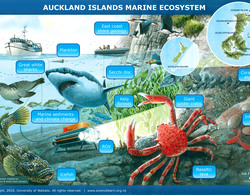
The most abundant fish of the Auckland Islands are the icefish of the family Nototheniidae. This family is known for its adaptation to its Antarctic origin – having ‘anti-freeze proteins’ in their blood. These proteins ‘attach’ to the surface of ingested ice crystals, halting ice formation and allowing bodily fluids to stay fluid. The icefish at the Auckland Islands are non-Antarctic members of the genus Notothenia – N. angustata and N. microlepidota. These fish have extremely low anti-freeze levels in their blood. However, as the anti-freeze proteins are present, an Antarctic evolutionary origin of the icefish found at the Auckland Islands can be concluded.
Meet some related Antarctic fish species here.
Why do you think biotechnologists are interested in anti-freeze proteins?
Image acknowledgement: Dave Allan/NIWA, Creative Commons 4.0


